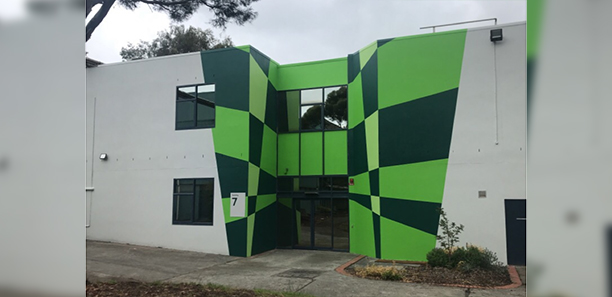
Above: Major internal renovations inside Building 7 at Yallourn campus have been complemented with a new external colour scheme using a combination of TAFE Gippsland and Opal Australian Paper brand colours. It depicts the collaboration in the development of the new training modules
New training courses in bio-manufacturing have been designed in Gippsland to provide vocational training and skills in this emerging technology for the local workforce.
Backed by a strategic partnership known as the BioPathways Partnerships Project, the training is the outcome of an industry-led collaboration between Opal Australian Paper, TAFE Gippsland and Federation University to assess and support Gippsland’s future bio-manufacturing training needs.
The new curriculum and a six-month renovation of TAFE Gippsland’s Yallourn campus Building 7 was jointly funded with $3.8 million from Victoria’s Workforce Training Innovation Fund (WTIF), and another $500,000 from Opal Australian Paper.
The project is delivering a purpose built, innovative bio-manufacturing training facility, including the latest bio-manufacturing equipment, and it is also investing in a new curriculum to support the training course.
TAFE Gippsland’s chief executive, Mr Grant Radford, said the refurbished building will now become the venue for a national first in vocational training with courses being offered from mid-2021.
“To ensure the course material and structure is effective, we have conducted a pilot course for 12 students, and we are very excited about promoting participation in this training to ensure a skilled workforce is available for future local projects using this emerging technology,” Mr Radford said.
“One objective is to develop our teacher and teaching resources showcasing what TAFE Gippsland can offer students interested in this emerging field, and we are working with our partners to create public awareness of the innovative training program.”
Mr Radford said another important overarching objective was to ensure TAFE Gippsland and its partners are “meeting local industry needs to achieve our longer-term objectives of targeted vocational education and better skills training providing exciting career outcomes”.
The benefits of more efficient use of bio-waste through bio-manufacturing techniques are emerging as potential new industries in the Latrobe Valley, and Opal Australian Paper’s Group General Manager, Mr Adrian Berton, said Opal Australian Paper is continuing to investigate new approaches based on the emerging bio-economy.
“Opal Australian Paper is seeking to better utilise bio-manufacturing processes to improve the efficiency and scope of its Maryvale operations,” Mr Berton said.
“The BioPathways Partnerships Project aims to develop accredited training in bio-manufacturing, introducing broader skillsets to the local workforce and ultimately supporting the development of a successful Gippsland bio-economy.”
The Victorian Government is strongly supporting new industry investment away from traditional industries such as fossil-fuel electricity generation as the Gippsland region diversifies into new energy opportunities.
The training courses are the first of their type in Australia to be accredited and developed for a TAFE institute.
For all media-related enquiries, call;
Neil Lawson - Communications Coordinator, TAFE Gippsland
Phone - 0419 425 804
Email - nlawson@tafegippsland.edu.au or news@tafegippsland.edu.au